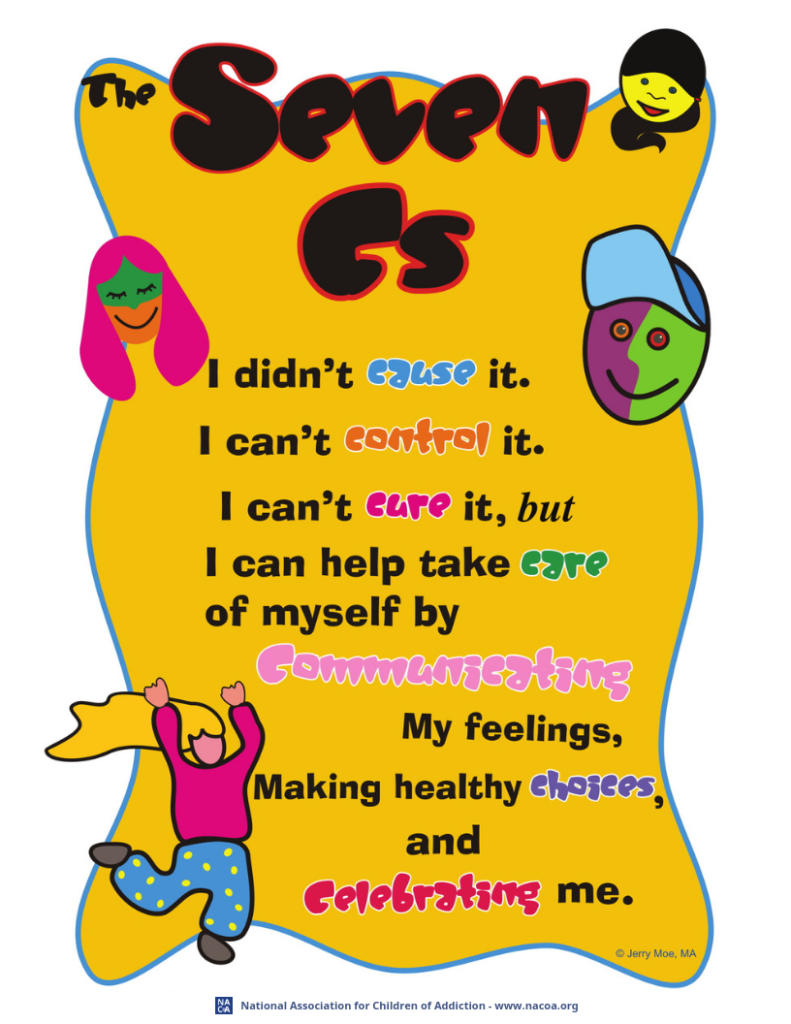No. They can be young, old, rich, poor, male, female, and any race or religion.
CFC #12020
Venmo @NacoaVoice4Children
CFC #12020
Venmo @NacoaVoice4Children
Growing up today can be a challenge. May these quotes help you to grow and develop new skills. May they lead you to increased hope and happiness.
- Cathy Brown, Betty LaPorte, Jerry Moe
Please don’t forget these four facts. They come in handy when you least suspect it.
1.
2.
3.
4.

Hi kids! Have you met Beamer? Beamer is growing up in a family impacted with addiction. You can tell what he’s feeling on the inside by the color of his head (yellow = happy, white = fear, red = anger, blue = sadness, blue = guilt, pink = embarrassment).
Are you a kid with a mom or dad who drinks too much? Here are some resources created to help kids just like you.
Alcohol use disorder is a disease. People with the disease have lost control over their drinking and cannot stop without help. They also lose control over how they act when they are drunk.
Doctors don’t know all the reasons why people suffer from alcohol use disorder. Some start out drinking a little bit and end up hooked on alcohol. A person might drink to forget problems or to calm nerves, but then they end up needing alcohol to feel normal. Once a person loses control over drinking, he or she needs help to stop drinking.
At first, the person with alcohol or substance use disorder is not aware that they are ill. Even when they become aware that something is wrong, they may not believe that alcohol or drugs are the problems. They might keep blaming things on other people, or might blame their job, or the house, or whatever. But, really, it’s the alcohol that’s the biggest problem.
No. They can be young, old, rich, poor, male, female, and any race or religion.
No. It is important to know that someone with an alcohol or drug use disorder needs help to stop drinking or using drugs, but no one can be forced to accept the help, no matter how hard you try or what you do. It is also important to know that family members by themselves cannot provide the help that that person needs. They need the help of people trained to treat the disease.
About eleven million children in our country are growing up with at least one parent with alcohol use disorder. There are probably a few in your class right now. And remember, some adults grew up with these types of parents too.
Talk to someone you trust about the problem. Talk to a teacher, a scout leader, a coach, a school counselor. Also, there is a group for kids who have parents with alcohol use disorder called “Alateen.” Alateen has meetings, like a club, and the kids share tips on how to make life easier. Find a meeting in your area by checking their online directory. Or you can search on the internet for Alateen and include your city, county or state. Someone at Al-Anon answer line – (757) 563-1600 – can probably tell you how to find the meetings too. Ask at school if there are any Alateen groups or school-sponsored support groups. If you have access to the internet, search “Alateen” together with the name of your county.
There is no cure for alcohol use disorder except stopping the disease process by stopping the drinking. People with alcohol use disorder who have completely stopped drinking refer to themselves as being “sober” and in “recovery.” People in recovery can lead healthy, happy, productive lives.

